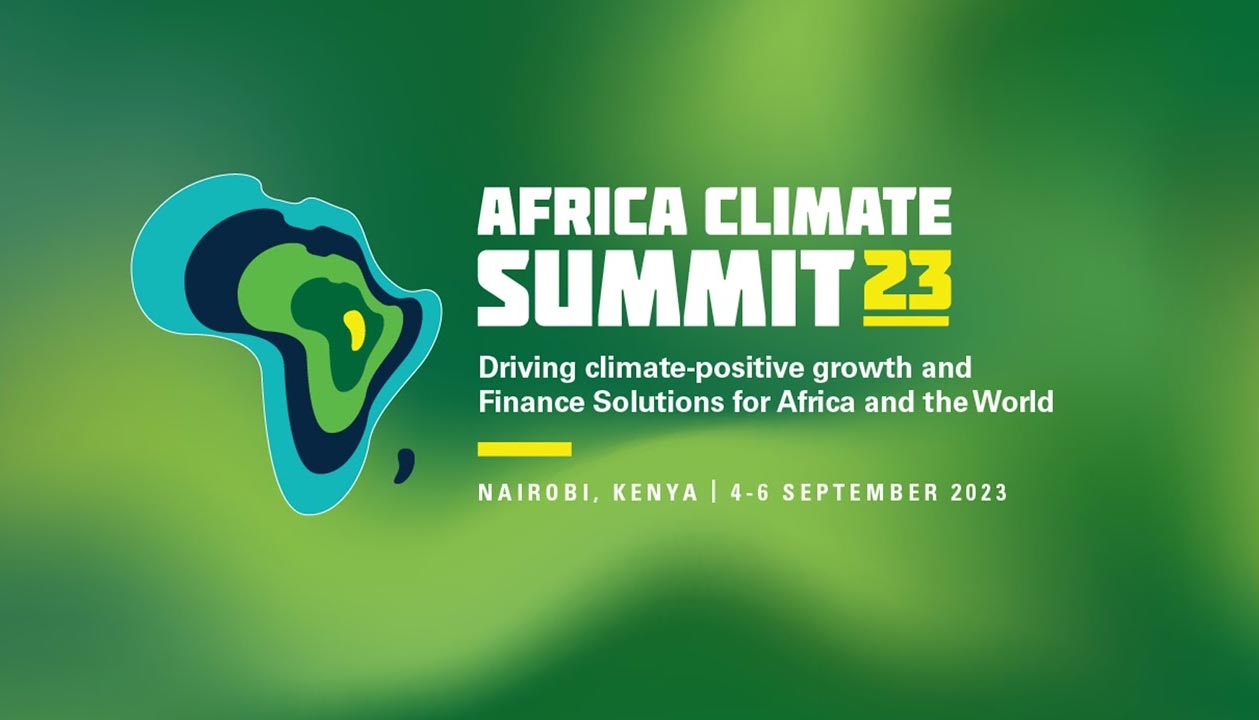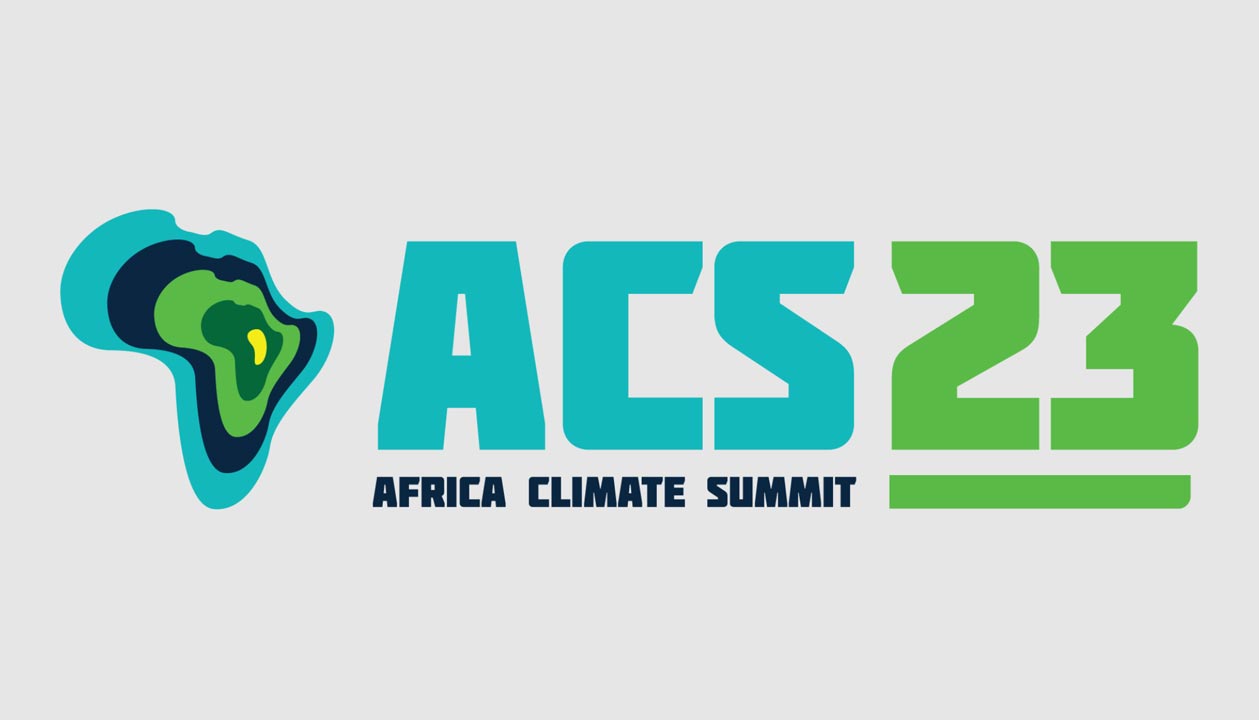The Africa Climate Summit (ACS) kicks off today in Nairobi, Kenya. The 3-day Summit will run from September 4th to 6th September 2023. The Africa Climate Week is organized to run from 4-8th September, in parallel with the Summit.
As African Heads of State and Governments take center- stage in framing the continent’s agenda on climate change, what do the citizens of Africa, experts, and indeed climate change activists in Africa, and across the world wish to hear? During this 3-day Summit, and the Africa Climate Week as a whole, we will capture some of these voices and opinions, but below is a synopsis of what we expect the action-packed week to look like.
One Goal, Diverse Voices
The inaugural Africa Climate Summit is a collaborative effort between the African Union Commission and the government of Kenya, the host nation. The Summit will be graced by African Heads of State and Government, global leaders, development partners, civil society organizations, researchers, academia, and an array of stakeholders. Speakers will include H.E. Ambassador Josefa Sacko, the African Union Commissioner for Agriculture Rural Development, Blue Economy, and Sustainable Environment.
During the Summit, African Heads of State and Governments will make ambitious pledges and commitments toward the adoption of a “Pledging and Commitment Framework.” This marks a historic first, as the African Union takes the bold step of hosting the unprecedented summit. Thus, the ACS presents a unique opportunity for Africa to assume a leadership role in shaping the global climate conversation toward the attainment of the broader global frameworks that seek to tackle Climate Change, viz, the United National Framework Convention on Climate Change, (UNFCCC), and the Paris Climate Agenda.
The anticipation surrounding the summit’s outcomes is palpable, with African citizens, and the global community at large, curious about the commitments and actions that will emerge in the Summit outcome document, the African Leaders Nairobi Declaration on a Green Growth and Climate Finance Agenda and Solutions for Africa and the World.
Globally, the Climate Change agenda resonates strongly with the youth, as exemplified by youth-led climate movements in the Northern Hemisphere. Not to be left behind, youth activists and leaders across Africa are unwaveringly dedicated to increasing awareness about, and advocating for climate action within their own continent, and the Global South. Their stories of commitment, case studies on resilience, and policy perspectives should find their way into the formal summit declarations to inform decisions and actions, not just within the continent, but on a global scale.
A Scene within a Bigger Play
Notably, the 28th Conference of Parties to the UN Framework Convention on Climate Change (COP28) will be held from November 30 to December 12, 2023, in the United Arab Emirates. The Conference of Parties will mark the conclusion of the first global stock-taking of the implementation of the Paris Agreement. The Paris Agreement seeks to bolster global response to the threat of climate change by keeping a global temperature rise this century below 2 degrees Celsius above pre-industrial levels. It commits to pursuing efforts to limit the temperature increase even further to 1.5 degrees Celsius. More importantly, in relation to Africa, the Agreement aims to strengthen countries’ ability to deal with the impacts of climate change and support them in their efforts in climate adaptation, and mitigation. At COP 28, the world will track progress toward achieving the Climate goals.
With COP28 just three months away, the timing of the ACS underlines it as a pivotal platform in clarifying and amplifying Africa’s progress towards meeting the Paris Commitments. Africa will be in the spotlight as it accentuates its bold, practical, and ambitious solutions to the most pressing global challenge of our time, Climate Change.
Holding the Climate summit in, and for Africa, is significant in addressing the continent’s immediate, perennial, and worsening climate challenges. Amplifying African voices in the Climate agenda will increase the prospects of finding more locally owned diagnostics and locally led solutions towards a more sustainable and resilient future for Africa, and the planet as a whole. It is expected that the Summit will showcase local solutions while empowering African nations to play a leadership role in accelerating commitments and actions toward global solutions to reversing climate change.
A Colossal Agenda Framed in Four Tracks
The Summit’s expectations are bold, including,
- defining a Pathway to a new global financial deal that includes “at scale” and fit-for-purpose financing instruments/products to serve specific growth goals;
- Securing Investment commitments, including showcasing multi-billion dollar worth of green investment deals on the continent across all thematic sectors of the summit; new partner initiatives around climate actions; Lastly and most importantly,
- A penned Roadmap for implementation of the Key Declarations.
The impact of climate change on Africa is undeniable. Prolonged droughts, devastating floods, and the encroachment of deserts threaten the continent’s agriculture, biodiversity, and communities.
The Africa Climate Summit and the Africa Climate Week 2023 have been thoughtfully structured into four distinct systems-based tracks, with each track spotlighting the interconnected strands of climate threats in Africa;




The challenge of the Summit is to distill a clear action agenda in this milieu of multifaceted challenges and opportunities presented by climate change on the African continent:
With Africa’s growing urbanization, standing at 47% in 2020, the Sustainable Urban Planning and Infrastructure track is timely and should delve into identifying the priority strategies for investments in green infrastructure and transport for resilient cities, and urban and rural Settlements.
We want to hear bold and actionable decisions about green roofs, urban forests, and green parks as efforts to promote air quality and temperature regulation in cities.
The Cog in the Wheels (pun intended) of urban transport pollution should be a focused conversation at the Summit.
- How are African cities poised to revolutionize public transportation systems to make them affordable and efficient?
- What are the prospects for realizing Smart cities, blending technology and sustainability through energy-efficient buildings and innovative IoT solutions for waste management and energy conservation?
- Which countries will be first adopters in these innovative solutions?
Since the onset of the Russia-Ukraine War, the transition from fossil fuels to renewable sources of energy such as solar, wind, and hydroelectric power has dominated global energy conversations. In most developed countries, there is increased government and private-sector-led efforts in accelerating Renewable Energy Integration and a cleaner energy mix; driving the transition from fossil fuels to renewable sources. Does Africa need its homegrown raison d’etre for a renewable energy transition in the continent in order to build the political movement for accelerating renewable energy integration, across African energy markets? Could this landmark summit be the tipping point for such a rallying call?
The Africa Climate Summit should take stock of the progress and the challenges associated with renewable energy adoption across Africa while isolating what must be boldly tackled through political and policy recalibration.
It is notable that Green Growth and Green Financing are a running thread across the Summit agenda, and rightly so. The Summit shed light on the instrumental role of green bonds in driving sustainable urban projects, and rural financing schemes for climate adaptation and mitigation solutions. Will the outcome document boldly stipulate the institutional mechanisms and policies necessary for empowering SMEs, and local communities in accessing green finance, amidst the fragile nature of these segments?
Global food security concerns have emerged top in the global security agenda, particularly in recent months, yet again, mostly triggered by the ongoing Russia-Ukraine conflict, and the disruptions in supply chains, occasioned by the COVID pandemic. In this renewed focus, Africa has catapulted to global attention as a strategic food reserve, with untapped agriculture and food potential. The Sustainable Agriculture and Food Security Track at the summit must therefore hinge on this expectation and outline the crucial measures in positioning Africa as the global food basket.
In order to put Africa on the pathway to becoming the global food basket, the Summit must make clear pronouncements about implementing climate-smart farming techniques to enhance crop yields; diversification in farming practices as a means to bolster food security; integration of indigenous farming practices into modern agriculture for sustainable food production; and exploring strategies for environmental impacts of food waste, both at the household levels and throughout the agri-business value chains.
Nature conservation and biodiversity are at the heart of the global climate change agenda. It is therefore laudable that the Africa Climate Summit will focus discussions on Land, Oceans, and the Blue Economy, with a strong emphasis on Ocean Conservation and Water Management. What are the bold solutions for the preservation of Africa’s marine ecosystems, noting their positive impact on biodiversity? What will be the collaborative efforts for sustainable fisheries management; what partnerships are necessary in boosting investments in modern technologies to address water scarcity across the continent? How can the continent expand responsible tourism along its vast coastlines, while preserving the fragile biodiversity?
No climate action conversation is complete without consideration of financial commitments and support.
We will explore the financial aspects of climate action in Africa, Examining the pledges and contributions from governments, international organizations, and the private sector. These commitments are essential in driving climate resilience and mitigation efforts forward in Africa.
As the Africa Climate Summit unfolds, and in the lead-up to COP28, the world watches with anticipation, and great expectations, Africa’s contributions and commitments to the Climate Change agenda. We will serve as your comprehensive guide to understanding the priority debates, expert opinions, influential voices, including the youth’s perspective, and innovative solutions that will shape the continent’s climate future.
Let’s hear your thoughts and opinions as Africa takes its position in catalyzing global action towards Climate Change.





